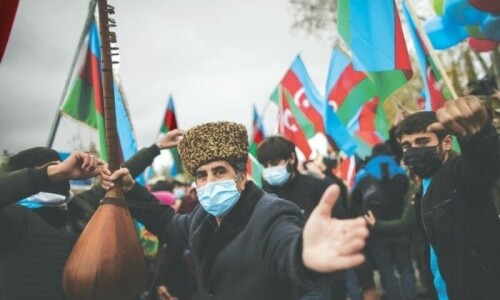What is the measure of a great country? An economist would tell you that it’s the GDP of the country, how much its industries can produce and export. An engineer might tell you to look at the infrastructure of a country. A better answer – though one that still falls short – will tell you that a great country is one that can ensure its children go to school. Going to school will certainly give you the tools for the pursuit of national caliber, but does not in itself provide us with a measure of greatness.
When the Mongol hordes invaded Mesopotamia, modern day Iraq, history knew a great civilisation had come to an end when the libraries of Baghdad were burned down. The measure of a country’s progress is not the strength of its economy or even literacy (for being educated does not mean being knowledgeable alas). The measure of a country’s progress is how many books are read.
It is not surprising then that here in Pakistan we have no culture of reading. A story vividly illustrates this. I was at JFK airport catching a flight back to Karachi from New York.
Reaching the terminal where the planes headed to Pakistan were located (you could tell because the terminal consisted of fidgeting people being entirely of South Asian descent with announcements being made in Urdu). One thing set this group apart from other terminals in every airport I have visited so far – not one of these people was reading a book!
I’m not even talking about great literature; not even cheap fiction or romantic wish wash! They all seemed to be either students studying at colleges or professionals from a variety of ages. It was hardly the case that they were not educated enough or did not have the financial resources to invest in books.
Go to any airport or board a train in any Western country and you will see people reading books. And I don’t mean school textbooks or study guides or cheat sheets that seem to proliferating around bookstores in the country. Why is this so in Pakistan? It’s probably a combination of a lack of curiosity, indifference, and an attitude that perhaps assumes knowledge of all answers to questions. This mind-set is also beholden to the punditry on television sets.
The late Eqbal Ahmed writing in these pages once lamented about Pakistan’s educated classes stating, “They are an educated lot in the sense that all are English speaking, and many if not the majority among them have foreign degrees. Yet their education precludes a life of mind. Things consumable things and people-you-know occupy the intellectual space." In the last seven years in this country, I have heard or engaged outside a very tiny circle of friends in less than half a dozen serious conversations. In a country fundamentally poor and underdeveloped there is precious little discussion here on the causes and remedies of poverty or underdevelopment. Equally excluded from those endless social evenings are books and ideas.
Serious book shops do badly in this country. You shall not find two good book shops in any of our cities. When an enterprising bookman opens a shop, as Najam Sethi did Vanguard in Lahore and Islamabad, he discovers that text-books are in demand not books, that shop lifters outnumber buyers, and trash outsells the serious even in literature. Gradually, they give up and go easy on "good books".
It wasn’t always like this. I once interviewed a gentleman about what Karachi was like right after Partition. Reminiscing, he fondly told me that the Saddar area was full of bookshops! Opening a bookshop was actually seen as a profitable exercise back then.
Today we are confronted with an ailing society, where those who can read, do not. It explains why Pakistanis cannot have an in-depth discussion on issues ranging from religion to politics. And why they have such a difficult time countering the myths that were taught to them in school about their history.
For things to change parents have to play a large role in getting their children to get into the habit of reading. One of the best ways to do this is to make them read thrillers or suspense novels, to get them into the habit of reading at an early age, before moving to some of the serious stuff. There are signs of hope – last year’s Karachi Literature Festival attracted crowds in the thousands, but a reading culture in cafes, libraries and parks is a long way to go.
At some point in the future when you look at Pakistan’s progress, and aren’t sure what to make of the GDP figures, go to a Pakistani airport or train terminal and look for book readers. The sad thing is, to improve this indicator of progress, you don’t need to set up your own NGO or build your own library. You simply need to pick up a book. Do it.

The views expressed by this blogger and in the following reader comments do not necessarily reflect the views and policies of the Dawn Media Group.












































